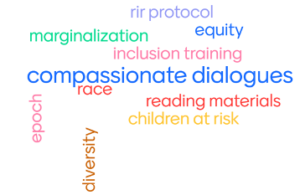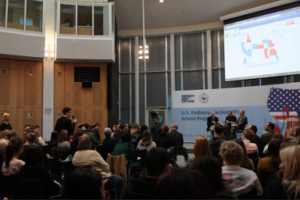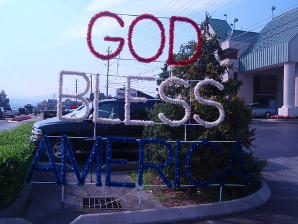We’re in our tenth year of Maple Leaf & Stars and Stripes
 At the dinner table, on the train, or at work, we witness discriminatory language or racist remarks from time to time. We often know that we should say something, but we – for one reason or another – do not always get involved. Many people would like to do more but don’t always know how. Dr. Nancy Dome, who has worked with children and educators for over 20 years, has literally made that quandary both her business and mission. This week’s blog features an interview with the CEO of Epoch Education about fostering the understanding of diversity and the development of inclusive cultures.
At the dinner table, on the train, or at work, we witness discriminatory language or racist remarks from time to time. We often know that we should say something, but we – for one reason or another – do not always get involved. Many people would like to do more but don’t always know how. Dr. Nancy Dome, who has worked with children and educators for over 20 years, has literally made that quandary both her business and mission. This week’s blog features an interview with the CEO of Epoch Education about fostering the understanding of diversity and the development of inclusive cultures.
The 2020 U.S. election has people around the world on the edge of their seats, wondering who will become the next President of the United States. The two candidates – former Vice President Joe Biden and the incumbent President, Donald Trump – would become the oldest men to ever have held this office. Another ‘first’ is Biden’s VP pick, Kamala Harris, junior senator from California, the first-ever woman of color running on a presidential ticket. In addition, a global pandemic, an economic crisis, and nationwide demonstrations protesting systemic racism make this election more exciting than ever.

While U.S. pollsters, such as Larry Sabato or Nate Silver, predict a likely victory for Democrat Biden, Trump’s 2016 surprise upset lead many pollster to ask how reliable election polls really are. And sometimes, the best pollsters are not those featured in the news, but are those found in high school classrooms.

January 1, 2000. Not just a new century, but a new millennium. Spotless, for the briefest moment, though far from empty. Arriving so brimful of promise and hope. “What will it be like?” we wondered, staring almost child-like at the clock as it approached the new era. A brand-new, unopened, ready-to-use millennium! And this time, with all we’d learned over past millennia, we would get things right.
Knock on wood.
It is ironic that, as the world’s first secular democracy having scorned all state religion, we soon became and have remained, socially and politically, preoccupied with god. Campaign speeches end with “God bless you.” The song, “God Bless America,” which Irving Berlin wrote as a parody sung by a comically chauvinistic character, is now performed as a patriotic hymn.

Are German-American relations in a critical state? If public opinion surveys are anything to go by, perhaps so – at least according to Germans. While Americans generally still hold on to a positive image of Germany, the same cannot be said for the way most Germans view the United States. A jointly conducted poll by the Pew Research Center and the Körber-Stiftung revealed late last year that while “three-quarters of Americans see relations with Germany as good,” nearly “two-thirds of Germans (64%) see relations as bad.” More alarmingly, the New York Magazine quotes a survey conducted by YouGov revealing that Germans view President Trump as “a greater threat to world peace than any other head of state” – a noteworthy distinction, especially in light of the existence of other controversial leaders, such as the likes of Kim Jong Un and Vladimir Putin.